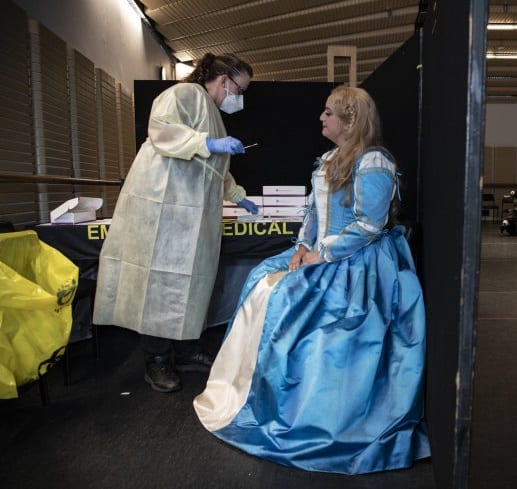How surviving cancer changed this 34-year-old’s attitude toward work: ‘The concept of checking email was laughable’
Liya Shuster-Bier saw success after success throughout her early adulthood. But two bouts with cancer changed her attitude toward life completely.

Liya Shuster-Bier had always been a high achiever. The 34-year-old Soviet Union refugee immigrated to New York with her parents in 1989. She attended Dartmouth on a scholarship and throughout her 20s worked at Goldman Sachs and a social impact startup in Boston, and completed her MBA at Wharton.
"All that was on my radar was the next exam, the next internship, the next job," she says. But in January 2018, six months after graduating from Wharton, she learned she had a rare form of non-Hodgkin lymphoma, a cancer that affects the body's immune system.
"Suddenly, me turning 30 was no longer a guarantee," she says.
Her year-and-a-half-long battle with the disease would ultimately change her priorities in life and attitude toward work completely.
'The concept of checking email was laughable'
When she was first diagnosed, Shuster-Bier was working at philanthropic fundraising company the Overton Project.
She went through six rounds of chemotherapy to eliminate the cancer, trying to maintain a normal life and work schedule even as the procedure landed her in the hospital. "I was literally taking the six train to Soho with chemo strapped to me," she says.
Though by summer it seemed Shuster-Bier's life could get back to normal, that October, the cancer came back. Now, treatment would require both radiation and a stem cell transplant which would force her to put a pause on life.
A stem cell transplant is, "a procedure in which a patient receives healthy stem cells (blood-forming cells) to replace their own stem cells that have been destroyed by treatment with radiation or high doses of chemotherapy," according to the National Cancer Institute.
"My doctor made me sign an affidavit that I would not work during the 100 days that I was a bubble girl after the transplant," says Shuster-Bier, who went on medical leave. This wasn't just because her doctor wanted to ensure that Shuster-Bier rested. The treatment is so aggressive she couldn't function on an elemental level.
Shuster-Bier recovering from her stem cell transplant in the Hudson Valley in 2019.
Courtesy Liya Shuster-Bier
"I could not walk around the block," she says, "I just didn't have the lung capacity." Reading was a challenge. Math was a challenge.
"The concept of checking email was laughable," she says.
'How do I actually pivot to nourishment?'
Even as she tried to heal, that period set off a mini crisis.
She'd so long invested most of her time producing, without work, "I was like, who am I?" she says. But it also made her start to question this attitude. She'd text her friends to take a walk or watch some Netflix and realize people were working as late as 8 p.m.
"We are literally spending the vast majority of our awake hours and the vast majority of our time at work," she says she thought. "For what?"
Shuster-Bier realized her way of life, "was literally just destroying me," she says. "Destroying my health, destroying my mental state, pushing me to the brink." As she regained her strength, she began paying attention to how much she slept, what she ate and how much time she spent with her husband. She even reexamined her spirituality.
"I started to see a new Rabbi," she says.
Instead of "destruction," she thought about a new attitude toward life, "How do I actually pivot to nourishment?"
'What feeds your being versus what feeds your doing?'
Shuster-Bier's mother had landed in remission from breast cancer just months before Shuster-Bier was diagnosed herself. Both experiences made her realize that beating the disease is not just about treating the cancer but about managing the symptoms following treatment.
Shuster-Bier recovering from chemotherapy in 2018.
Courtesy Liya Shuster-Bier
"No one was helping me manage my constipation, my headaches, my dehydration," she says, adding that, "I was motivated to start a place where this all existed."
Shuster-Bier went back to the Overton Project after recovering from the transplant but within months founded Alula, a product marketplace for patients navigating these and other symptoms. She began working on it full-time in December 2019. The cancer forced her to go into medically induced menopause, and she and her husband agreed that she could invest the money they had saved for starting a family to found the company. She's also raised $2 million to run it since.
Though the life of an entrepreneur is traditionally nonstop and hectic (25 hours per day if you ask Kevin O'Leary), Shuster-Bier has continued applying the attitude she built after treatment and focuses on nourishment and health.
Instead of being out until 11 p.m. and back at her desk by 5 a.m., as she'd sometimes done in the past, she wakes up naturally every day between 5:30 and 7:45. She starts her workday at 10 a.m. and finishes no later than 6 or 7. She makes ample time for her husband, puppy and friends, and for taking walks and cooking.
"The new compass for me," she says, is "what feeds your being versus what feeds your doing?" Three years into remission, the new attitude appears to be working.
Check out:
Exercise 2-4x more than the HHS recommends to achieve maximum benefit, says new study
Want better sleep? Try 5 foods naturally rich in melatonin
4 entrepreneurs who've raised millions on the morning routines that set them up for success
Sign up now: Get smarter about your money and career with our weekly newsletter

 Hollif
Hollif 
































